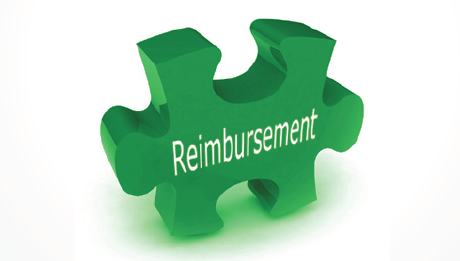Repack Reimbursement Process Outlined

WASHINGTON—The post-auction TV station relocation reimbursement process is taking shape. The reimbursement form has received the federal seal of approval from the Office of Management and Budget. Broadcasters who wish to tap into the $1.75 billion relocation fund set aside by Congress from expected incentive auction revenues will need to use an interactive online version of FCC Form 2100, Schedule 399, (the “paper” representation of the form sent to the OMB for approval, which was announced via publication in the Federal Register March 24.)
The debut date of the live, interactive form has not yet been announced. The auction is set to commence Tuesday, March 29.
The OMB OK’d both the form and directions, which state that Form 2100 can be used by TV stations and cable operators for advance estimates, for actual costs and for the final accounting.
PRE-AUCTION EXPENSES
The Federal Communications Commission has not yet determined if pre-auction planning expenses will be reimbursable, but a decision is expected any time. Pre-auction planning expenses may comprise tower mapping or other engineering consultation work.
Even if pre-auction planning expenses are deemed reimbursable, they will not be paid until after the auction closes. If the auction does not raise enough money at any clearing target to cover administrative expenses and the relocation reimbursement fund, as well as reaching a spectrum-price threshold, it will not close and broadcasters could be on the hook for pre-auction expenses. The FCC has set a graduated range of clearing targets from 126 MHz down to 42 MHz. If the initial clearing target is 126 and that auction stage fails to close, then the commission will drop to a lower target and resume the auction.
Assuming the auction does close, the statute requires reimbursement within three years of that time.
The rules of eligibility and reimbursement are included in the FCC’s May 2014 Report and Order, “Expanding the Economic and Innovation Opportunities of Spectrum Through Incentive Auctions,” and in the Code of Federal Regulations.
ELIGIBILITY
Only full-power and Class A TV licensees are eligible, as well as cable TV plant modifications made “in order to continue to carry the signal of a broadcast television licensee” reassigned to a new channel in the repack:
(1) Full-power or Class A TV stations involuntarily reassigned in the repacking process;
(2) Channel-sharer stations involuntarily reassigned in the repacking process;
(3) Broadcast TV licensees that voluntarily move from a UHF to a VHF channel;
(4) Broadcast TV licensees that voluntarily move from a high VHF to a low VHF; and
(5) Broadcast TV licensees that voluntarily relinquish spectrum usage rights to share a channel with another licensee.
Only the host TV station in a channel-sharing arrangement is eligible for repacking reimbursement, and only if the shared facility receives a new channel assignment. “Sharees” are those stations relinquishing spectrum in the auction and will not be reimbursed for moving to a shared facility. Moving expenses for broadcast auxiliary service operations are not eligible for reimbursement. Wireless mic users and non-Class A low-power TV licensees are ineligible as well.
ALLOCATION
Broadcasters and cable operators who submit estimates will receive an initial allocation of up to 80 percent of estimated costs. A cost catalog of equipment and services—based on the December 2013 Widelity Report—will be embedded in the online version of Form 2100. Given the date of the report, the commission intends to seek comment on how to adjust those prices accordingly.
If an item is not in the cost catalog or a price differential occurs in estimating expenses, a broadcaster may submit “supporting evidence and certify that the estimate is made in good faith.”
Broadcasters who receive an initial allocation will be able to draw against it as they incur moving expenses. These must then be submitted as “actual costs” with receipts, invoices and other documentation by a date to be determined by the FCC’s Media Bureau. Final accountings will take place thereafter. Should the $1.75 billion not cover 100 percent of aggregate repacking expenses, it will be distributed proportionally.
‘REASONABLY INCURRED’
The Spectrum Act states that relocation costs must be “reasonably incurred” to qualify for reimbursement. The commission interpreted “reasonably incurred” in the 2014 R&O as follows:
“We interpret the Spectrum Act’s mandate to reimburse ‘costs reasonably incurred’ to require that we reimburse costs that are reasonable to provide facilities comparable to those that a broadcaster or [multichannel video provider] had prior to the auction that are reasonably replaced or modified following the auction, as a result of the repacking process, in order to allow the broadcaster to operate on a new channel or to allow the MVPD to carry the signal of a broadcaster on a new channel.”
The commission also said it expects that stations will not always be able to replace older, legacy equipment with “comparable” equipment when, for example, manufacturers no longer support older models, and because of advances in technology. The commission said it would recognize that some reimbursable technology may include “improved functionality,” but that it does intend to reimburse applicants for new, optional features in equipment, “unless the station or MVPD documents that the feature is already present in the equipment that is being replaced.”
Finally, the commission said that stations and MVPDs can upgrade on their own dime, and it will reimburse for the cost minus the upgrade.
Get the TV Tech Newsletter
The professional video industry's #1 source for news, trends and product and tech information. Sign up below.
